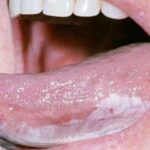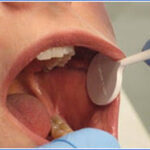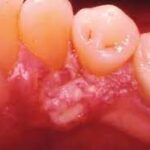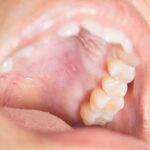In the United States, oral cancer makes up an estimated 4 percent of all cancer diagnoses each year. That means 54,000 new cases of oral cancer per year, and over 11,000 deaths. Unfortunately, because many types of oral cancer do not present early on with noticeable symptoms, this type of cancer is often discovered late. For this reason, routine oral examinations and oral cancer screenings are very important.
Grouped as a type of head and neck cancer, oral cancer may develop in many areas.
Types of oral cancer, based on where they originate include:
- Tongue cancer (25% of cases)
- Labial/Buccal Mucosa (the inner lining between the lips and cheek) (21.7%)
- Gingiva (gums) 14%
- Palate and Uvula 10%
- Alveolar Mucosa (the inner lining between the lips and gums) (8%)
- Other areas (21%)
According to the American Society of Clinical Oncology (ASCO), more than 90 percent of oral cancers are squamous cell carcinomas that begin in the flat squamous cells lining the throat and mouth.
A Review of the Most Common Oral Cancer Sites:
Tongue Cancer

Tongue cancer is divided into two types, depending upon where it occurs:
- Tumors in the front two-thirds of the tongue, located in your mouth, are categorized as oral tongue cancer.
- Tumors in the base of the tongue, the rear third located in your throat or oropharynx, form the second type.
Oral tongue tumors are often noticed by patients or by their dentists or primary care physicians. Therefore, patients with oral tongue tumors may receive treatment in earlier stages than those with base of tongue cancers.
Labial/Buccal Mucosa (Lip and Inner Cheek) Cancer

Inner cheek cancer is typically a squamous cell carcinoma, meaning it most often develops in the squamous cells that make up the tissue lining the cheeks. Compared with other oral cancers, buccal mucosa squamous cell carcinoma is aggressive with rapid growth, deep penetrations, and a high rate of recurrence.
Signs of buccal mucosa cancer may include:
- Ear, teeth and/or jaw pain.
- White or red patch or ulcerative lesion in the inner cheek.
- Difficulty chewing, swallowing, or moving the jaw.
- Lump or thickening inside cheek tissue.
- Pain or numbness of the mouth.
- Persistent sore throat, or a feeling like something is caught in your throat.
- Hoarseness or changes in your voice Loose teeth or dentures that don’t fit.
Gingival/Gum Cancer

Gum cancer occurs when cells in your gum tissue grow out of control, forming malignant lesions/tumors. It’s a rare, slow-growing carcinoma, accounting for 14 percent of oral cancers. Because the symptoms are so similar, gum cancer can be easily mistaken for gingivitis.
Symptoms of gum cancer may include:
- White or red patches on the gums
- Ulcerative lesion on the gums
- Bleeding or painful gums
- Lumps on or thickening of the gums
Palate (Roof of Mouth) Cancer

This is found in the bony structures of the hard palate, and sometimes, the uvula. Because of its proximity, this cancer may spread to the nasal cavity when it reaches an advanced stage. Hard palate cancer is typically seen or felt by the naked eye, most often beginning with a painful sore on the roof of the mouth that doesn’t heal.
Other signs of hard palate cancer may include:
- White or red patch on the roof of the mouth
- Ulcerative lesion on roof of the mouth
- Fullness or swelling in roof of the mouth
- Pain or difficulty swallowing
- Painful mouth sores
- Upper loose teeth or tooth pain
- Upper dentures that don’t fit correctly
- Numbness in cheek or upper teeth
- Difficulty opening your mouth
- Difficulty speaking
- Persistent bad breath
- Neck lump (when hard palate cancer has spread to the lymph nodes)
Other Cancers
Floor of the mouth cancer occurs when cancer cells form in the tissue under the tongue. This type of cancer often appears as a mouth ulcer that doesn’t heal, and it may be confused with a canker sore.
Other signs of floor of the mouth cancer may include:
- White or red patch on the floor of the mouth
- Ulcerative lesion on the floor of the mouth
- Pain or numbness in the floor of the mouth
- Neck lump
What Causes Oral Cancer? Top 3 Causes:
- Smoking (85% of oral cancer occurs in tobacco users)
- Drinking Alcohol
- HPV
Most types of Oral Cancer are associated with heavy tobacco and alcohol use, as well as with the human papillomavirus (HPV).
Combined, smoking and drinking can increase your risk of developing oral cancer by 30 times, according to the American Cancer Society (ACS), as compared with people who don’t smoke or drink. Moreover, according to ASCO, 85 percent of all head and neck cancers are linked to tobacco use.
HPV infection may cause about 70 percent of oropharyngeal (throat) cancers, including cancers of the base of the tongue and tonsils, according to the Centers for Disease Control and Prevention (CDC). The virus has not been proven to cause head and neck cancers in the salivary glands, lips, nose or larynx. (Thankfully, there is a vaccination available for HPV. It is highly recommended that everyone get it).
Who Is at Risk?
Historically, oral cancer primarily affected men over 50, but rates among women and younger people have risen in recent decades—and it’s thought that HPV infection is partially responsible. (HPV is the most common sexually transmitted disease.)
In addition to tobacco and alcohol use and HPV infection, other risk factors for mouth and throat cancers include:
- Age: Being older than 45
- Gender: Being male
- Poor nutrition: Eating a diet low in fruits and vegetables and sources of vitamin A
- A weakened immune system
- Some genetic syndromes
- Lichen planus, an inflammation of mucous membranes
- Marijuana use (some studies suggest higher risk)
How Is It Treated?
Surgery, radiation therapy and chemotherapy are used to treat tongue cancer. Sometimes, targeted drug therapy may also be recommended.
Oral cancer screening is a routine part of our comprehensive oral exam, so it’s important to maintain a regular cleaning and exam schedule. With regular visits, we can identify any problems early on, greatly improving the diagnosis and treatment of this disease. If you haven’t been seen for an examination in a while, contact us here or call us at 972-810-1255 for an examination today!
